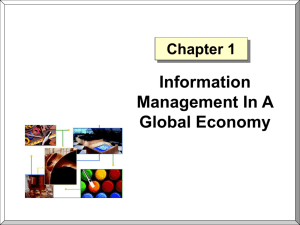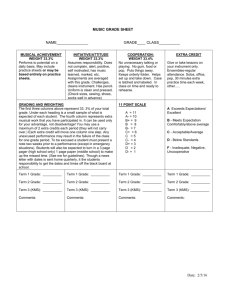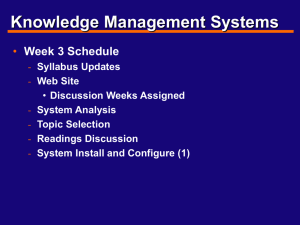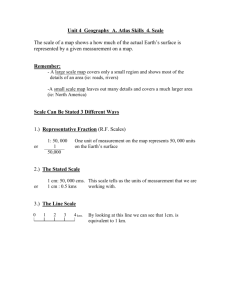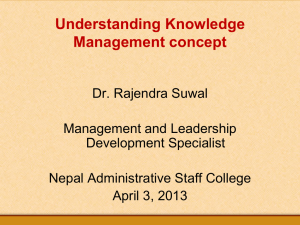ch8 - WordPress.com
advertisement
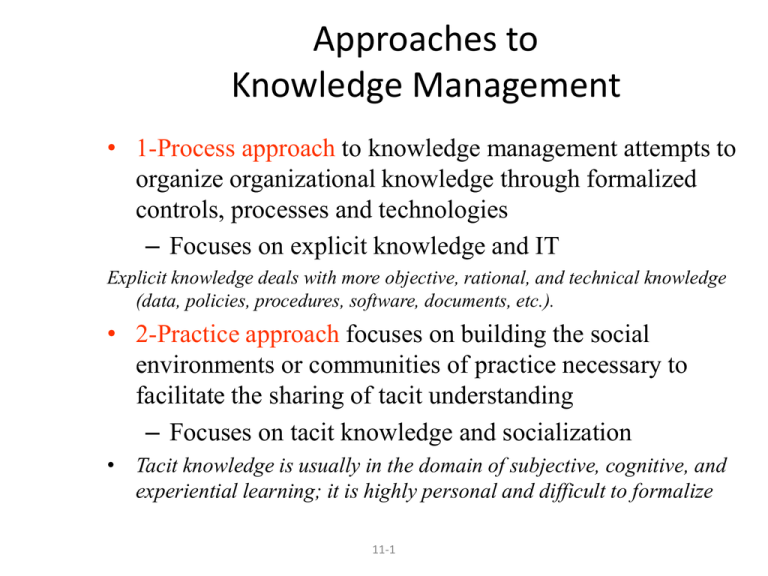
Approaches to Knowledge Management • 1-Process approach to knowledge management attempts to organize organizational knowledge through formalized controls, processes and technologies – Focuses on explicit knowledge and IT Explicit knowledge deals with more objective, rational, and technical knowledge (data, policies, procedures, software, documents, etc.). • 2-Practice approach focuses on building the social environments or communities of practice necessary to facilitate the sharing of tacit understanding – Focuses on tacit knowledge and socialization • Tacit knowledge is usually in the domain of subjective, cognitive, and experiential learning; it is highly personal and difficult to formalize 11-1 Approaches to Knowledge Management • 3-Hybrid approaches to knowledge management – The practice approach is used so that a repository(warehouse) stores only explicit knowledge that is relatively easy to document – Tacit(implicit)knowledge initially stored in the repository is contact information about experts and their areas of expertise – Increasing the amount of tacit knowledge over time eventually leads to the attainment of a true process approach 11-2 Knowledge Management A Demand Led Business Activity • Supply-driven vs. demand-driven KM Supp ly-dr iven : Data summarize DIKA R n Tech ol h roac p p a ogy Results obtain Information Action contextulize Bu s i n e ss -valu e utilize Knowledge appr o a ch 11-3 Dem a : RA n e v i r nd-d KID Approaches to Knowledge Management • Best practices are the activities and methods that the -most effective organizations use to operate and manage various functions -In an organization, the best methods for solving problems. These are often stored in the knowledge repository of a knowledge management system • Knowledge repository is the actual storage location of knowledge in a knowledge management system. Similar in nature to a database, but generally text-oriented 11-4 Approaches to Knowledge Management A Comprehensive View to Knowledge Repository KNOWLEDGE UTILIZATION KNOWLEDGE MANAGEMENT PLATFORM (KMP) KNOWLEDGE PORTAL (Web-based End User Interface) Human Experts Intelligent Broker KNOWLEDGE CREATION KNOWLEDGE REPOSITORY (Knowledge / Information / Data Nuggets) Web Crawler Data/Text Mining Tools DIVERSE INFORMATION / DATA SOURCES (Weather / Medical Info / Finance / Agriculture / Industrial) 11-5 Ad hoc Search JUN 1 5 Manual Entries Approaches to Knowledge Management • Developing a knowledge repository – Knowledge repositories are developed using several different storage mechanisms in combination 11-6 Information Technology (IT) in Knowledge Management The Cyclic Model of Knowledge Management Capture Knowledge Create Knowledge 2 1 Refine Knowledge 6 Disseminate Knowledge Store Knowledge 11-7 Manage Knowledge 5 3 4 Information Technology (IT) in Knowledge Management • Components of KMS – KMS are developed using three sets of core technologies: 1. Communication 2. Collaboration 3. Storage and retrieval – Technologies that support KM • Artificial intelligence • Intelligent agents • Knowledge discovery in databases • Extensible Markup Language (XML) 11-8 Technologies that support KM • Artificial intelligence – AI methods used in KMS: • Assist in and enhance searching knowledge • Help for knowledge representation (e.g., ES) • Help establish knowledge profiles of individuals and groups • Help determine the relative importance of knowledge when it is contributed to and accessed from the knowledge repository 11-9 Technologies that support KM • AI methods used in KMS: – Scan e-mail, documents, and databases to perform knowledge discovery, determine meaningful relationships and rules – Identify patterns in data (usually through neural networks and other data mining techniques) – Forecast future results by using data/knowledge – Provide advice directly from knowledge by using neural networks or expert systems – Provide a natural language or voice command–driven user interface for a KMS 11-10 Technologies that support KM • Intelligent agents – Intelligent agents are software systems that learn how users work and provide assistance in their daily tasks – They are used to cause and identify knowledge • See ibm.com, gentia.com for examples – Combined with enterprise knowledge portal to proactively disseminate knowledge 11-11 Technologies that support KM • Knowledge discovery in databases (KDD) is A machine learning process that performs rule instruction, or a related procedure to establish (or create) knowledge from large databases – a.k.a. Data Mining (and/or Text Mining) 11-12 Information Technology (IT) in Knowledge Management • Model marts Small, generally departmental repositories of knowledge created by employing knowledge-discovery techniques on past decision instances. Similar to data marts • Model warehouses Large, generally enterprise-wide repositories of knowledge created by employing knowledge-discovery techniques. Similar to data warehouses Technologies that support KM • Extensible Markup Language (XML) • Web 2.0 11-13 KM System Implementation • Knowledge management products and vendors – Knowware Technology tools (software/hardware products) that support knowledge management – Software development companies / vendors • Collaborative computing tools • Knowledge servers • Enterprise knowledge portals (EKP) An electronic doorway into a knowledge management system… 11-14 KM System Implementation • Software development companies / vendors – Electronic document management (EDM) A method for processing documents electronically, including capture, storage, retrieval, manipulation, and presentation – Content management systems (CMS) An electronic document management system that produces dynamic versions of documents, and automatically maintains the current set for use at the enterprise level 11-15 KM System Implementation • Software development tools – Knowledge harvesting tools – Search engines – Knowledge management suites – Knowledge management consulting firms – Knowledge management ASPs 11-16 KMS Implementation • Integration of KMS with other business information systems – With DSS/BI Systems – With AI – With databases and information systems • With CRM systems (Customer Relationship (Resource) Management) • With SCM systems Supply-chain management – With corporate intranets and extranets 11-17 Ensuring the Success of Knowledge Management Efforts • Success stories of knowledge management – Implementing a good KM strategy can: • Reduce… – loss of intellectual capital – costs by decreasing the number of times the company must repeatedly solve the same problem – redundancy of knowledge-based activities • Increase… – productivity – employee satisfaction 11-18 Ensuring the Success of Knowledge Management Efforts • MAKE: Most Admired Knowledge Enterprises “Annually identifying the best practitioners of KM” – Criteria (performance dimensions): 1. 2. 3. 4. 5. 6. 7. 8. Creating a knowledge-driven corporate culture Developing knowledge workers through leadership Fostering innovation Maximizing enterprise intellectual capital Creating an environment for collaborative knowledge sharing Facilitating organizational learning Delivering value based on stakeholder knowledge Transforming enterprise knowledge into stakeholders’ value 11-19 Ensuring the Success of Knowledge Management Efforts • MAKE: Most Admired Knowledge Enterprises “Annually identifying the best practitioners of KM” – 2008 Winners: 1. 2. 3. 4. 5. 6. 7. 8. 9. McKinsey & Company Google Royal Dutch Shell Toyota Wikipedia Honda Apple Fluor Microsoft 11-20 10. 11. 12. 13. 14. 15. 16. 17. 18. PricewaterhouseCoopers Ernst & Young IBM Schlumberger Samsung Group BP Unilever Accenture … Ensuring the Success of Knowledge Management Efforts • Useful applications of KMS – Finding experts electronically and using expert location systems • Expert location systems (know-who) Interactive computerized systems that help employees find and connect with colleagues who have expertise required for specific problems— whether they are across the county or across the room—in order to solve specific, critical business problems in seconds 11-21 Ensuring the Success of Knowledge Management Efforts • Knowledge management valuation – Financial metrics for knowledge management valuation • Focus knowledge management projects on specific business problems that can be easily quantified • When the problems are solved, the value and benefits of the system become apparent 11-22 Ensuring the Success of Knowledge Management Efforts • Knowledge management valuation – Nonfinancial metrics for knowledge management valuation—new ways to view capital when evaluating intangibles: • • • • • • Customer goodwill External relationship capital Structural capital Human capital Social capital Environmental capital 11-23 Ensuring the Success of Knowledge Management Efforts • Causes of knowledge management failure – The effort mainly relies on technology and does not address whether the proposed system will meet the needs and objectives of the organization and its individuals – Lack of emphasis on human aspects – Lack of commitment(obligation) – Failure to provide reasonable incentive (encouragement) for people to use the system… 11-24 Ensuring the Success of Knowledge Management Efforts • Factors that lead to knowledge management success – A link to a firm’s economic value, to demonstrate financial viability and maintain executive sponsorship – A technical and organizational infrastructure on which to build – A standard, flexible knowledge structure to match the way the organization performs work and uses knowledge – A knowledge-friendly culture that leads directly to user support – A clear purpose and language, to encourage users to buy into the system – A change in motivational practices, to create a culture of sharing – Multiple channels for knowledge transfer – A significant process orientation and valuation to make a knowledge management effort worthwhile – Nontrivial motivational methods to encourage users to contribute and use knowledge – Senior management support 11-25 Last words on KM • Knowledge is an intellectual(brain, thinker) asset • IT is “just” an important enabler • Proper management of knowledge is a necessary ingredient for success • Key issues: – Organizational culture – Executive sponsorship – Measurement of success 11-26
